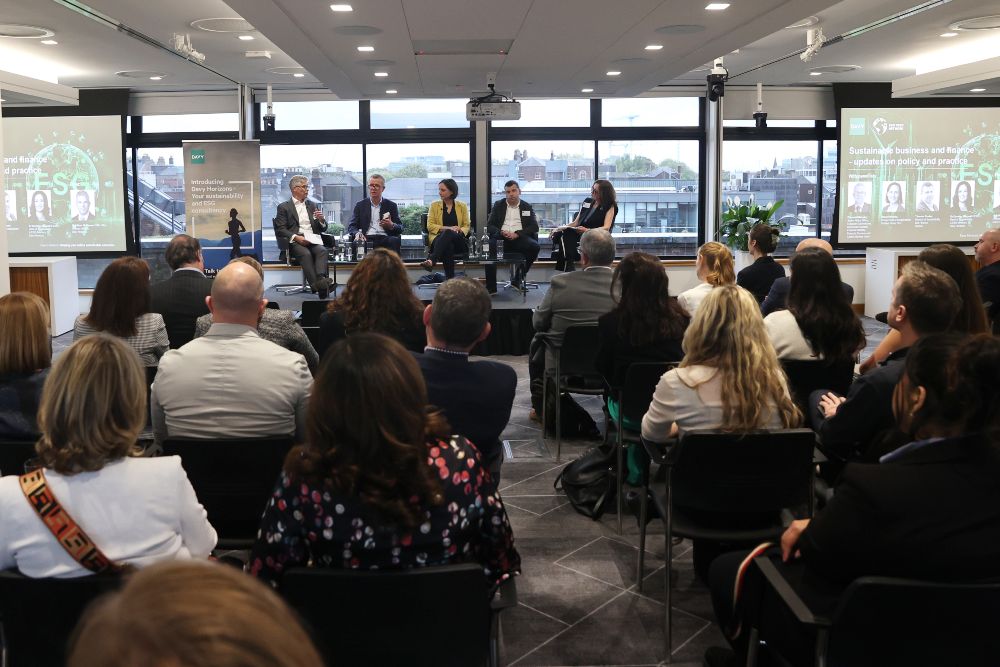John Cradden asks what role do SMEs in Ireland have to play in combating climate change and how can they take climate action?
In order to help achieve Ireland’s Climate Action Plan target for reducing greenhouse gas emissions by 2030, every company, large and small, will need to decarbonise. The business sector must reduce its emissions by 35%, while Ireland as a whole must cut its output of greenhouse gases by 51%.
While the government has a plan, failure to meet the EU targets based on its existing policies and measures could cost Ireland between €8bn and €26bn in fines or costs, according to a joint report published in March 2025 by the Fiscal Council and the Climate Change Advisory Council.
“The good news is that a growing array of supports are now available for businesses to encourage their investment in more sustainable products, services and business models”
But as sustainability moves up the agenda for firms as they seek to find their place in a low-carbon, circular economy, looking at combating climate change as both a challenge and an opportunity is a good way to approach it.
Grants and incentives
The good news is that a growing array of supports are now available for businesses to encourage their investment in more sustainable products, services and business models.
Enterprise Ireland’s Green Transition Fund has two elements to it: the Climate Planning Fund for Business and the Enterprise Emissions Reduction Investment Fund (EERIF).
The former includes a number of grants towards the costs of developing strategic action plans and environmental management capabilities, introducing environment best practice systems and structures, and the hiring of strategic consultants.
For manufacturing businesses, the EERIF provides financial supports and grants towards innovation and research & development in decarbonisation products or services, as well as the costs of energy monitoring and tracking systems, and carbon-reducing technologies.
Many businesses will probably be familiar with the energy-efficiency grants as provided by SEAI, including for solar PV panels, but the Local Enterprise Office could be the first port of call for small businesses in terms of finding out which grants would suit best.
SEAI is behind the Excellence in Energy Efficiency (EXEED) grant scheme, which provides grants of up to €3 million for projects to design more energy efficient building and manufacturing processes.
The Accelerated Capital Allowance (ACA) is a tax incentive scheme. It allows a sole trader, farmer or company that pays corporation tax in Ireland to deduct the full cost of energy-efficient equipment from their profits in the year of purchase.
The Support Scheme for Renewable Heat provides capital grants towards the costs of renewable heating technologies, specifically air, ground or water source heat pumps. The scheme also provides ‘operational tariff’ support for biomass or biogas heating systems.
Training and mentoring
There are number of training and mentoring supports to help you develop sustainability measures in your business.
Skillnet’s Climate Ready Academy provides specialised training programmes for businesses in the areas of climate action, sustainability and corporate social responsibility (CSR). These programmes can be online workshop-based or through access to an online learning platform.
The Local Enterprise Office’s Green for Business is a free programme that helps small businesses take the first steps towards becoming more sustainable. It can also provide a full list of all the supports available for sustainability and ESG.
Online resources
There are also a number of online resources for businesses across a number of areas linked to sustainability.
Water Conservation for Business is an online information hub to help businesses conserve water, and includes videos, fact-sheets and how-to guides to help reduce water waste. There are also some guide for specific business sectors, too.
The Climate toolkit 4 Business from Gov.ie contains a number of online interactive tools that allow you to calculate your company’s carbon footprint and get practical advice on how to reduce it.
The Environmental Protection Agency’s Tool for Resource Efficiency focuses more on optimising your company’s resource efficiency when it comes to water, waste and energy.
The SEAI’s Energy Academy is an e-learning service that advises on how organisations can meet their energy efficiency goals, reduce carbon footprint and upskill staff.
Some of these tools will also provide some insights into how you can set goals and track and monitor your company’s progress regarding its sustainability journey against your initial audit. There are also software products that can automate or manage this tracking and monitoring.
It’s worth also bearing in mind the emerging and still developing area of legal requirements for sustainability reporting. While it looks like only the largest companies will come under the most rigorous reporting standards of the new Corporate Sustainability Reporting Directive (CSRD), SMEs who supply large companies that fall under the CRSD scope can enhance relationships with them as supportive partners in the process by following SME voluntary reporting standards, which have been tailored to fit their capabilities and resources.
Main image at top: Photo by Tobias Weinhold on Unsplash
-
Bank of Ireland is welcoming new customers every day – funding investments, working capital and expansions across multiple sectors. To learn more, click here
-
For support in challenging times, click here
-
Listen to the ThinkBusiness Podcast for business insights and inspiration. All episodes are here. You can also listen to the Podcast on:
-
Spotify
-
SoundCloud
-
Apple





